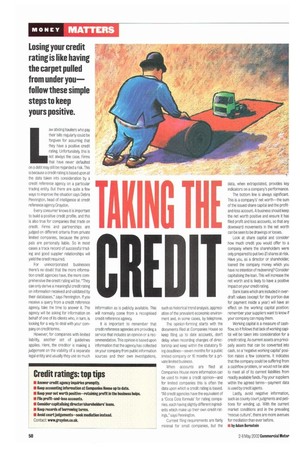TAKING THE
Page 50

If you've noticed an error in this article please click here to report it so we can fix it.
Law abiding hauliers who pay their bills regularly could be forgiven for assuming that they have a positive credit rating. Unfortunately this is not always the case. Firms that have never defaulted on a debt may still be regarded a risk. This is because a credit rating is based upon all the data taken into consideration by a credit reference agency or a particular trading entity. But there are quite a few ways to improve the situation says Debra Pennington, head of intelligence at credit reference agency Graydon.
Every consumer knows it is important to build a positive credit profile, and this Is also true for companies that trade on credit. Firms and partnerships are judged on different criteria from private limited companies, because the principals are personally liable. So in most cases a track record of successful trading and good supplier relationships will yield the credit required.
For unincorporated businesses there's no doubt that the more information credit agencies have, the more comprehensive the credit rating will be. They can only derive a meaningful credit rating on information received and validated by their databases," says Pennington. If you receive a query from a credit reference agency, take the time to answer it. The agency will be asking for information on behalf of one of its clients who, in turn, is looking for a way to deal with your company on credit terms.
However, for companies with limited liability, another set of guidelines applies. Here, the creditor is making a judgement on the viability of a separate legal entity and usually they use as much information as is publicly available. This will normally come from a recognised credit reference agency.
It is important to remember that credit reference agencies are providing a service that includes an opinion or a recommendation. This opinion is based upon information that the agency has collected on your company from public information sources and their own investigations, such as historical trend analysis, appreciation of the prevalent economic environment and, in some cases, by telephone.
The opinion-forming starts with the documents filed at Companies House so keep filing up to date accounts, don't delay when recording changes of directorship and keep within the statutory tiling deadlines—seven months for a public limited company or 10 months for a private limited business.
When accounts are filed at Companies House more information can be used to make a credit opinion—and for limited companies this is often the data upon which a credit rating is based. All credit agencies have the equivalent of a 'Coca Cola formula' for rating companies, each having slightly different ingredients which make up their own credit ratings," says Pennington.
Current filing requirements are fairly minimal for small companies, but the data, when extrapolated, provides key indicators on a company's performance.
The bottom line is always significant. This is a company's' net worth—the sum of the issued share capital and the profitand-loss account. A business should keep the net worth positive and ensure it has tiled profit and loss accounts, so that any downward movements in the net worth can be seen to be drawings or losses.
Look at share capital and consider how much credit you would offer to a company where the shareholders were only prepared to put two El shares at risk. Have you, as a director or shareholder, loaned the company money which you have no intention of redeeming? Consider capitalising the loan. This will increase the net worth and is likely to have a positive impact on your credit rating.
Bank loans which are included in overdraft values (except for the portion due for payment inside a year) will have an effect on the working capital position: remember your suppliers want to know if your company can repay them.
Working capital is a measure of cashflow, so it follows that lack of working capital will be taken into consideration for a credit rating. As current assets are principally assets that can be converted into cash, so a 'negative working capital' position raises a few concerns. It indicates that the company could be suffering from a cashtlow problem, or would not be able to meet all of its current liabilities from reedit/ available funds. Pay your suppliers within the agreed terms—payment data is used by credit agents.
Lastly, avoid negative information, such as county court judgments and petitions for winding up. With the current market conditions and in the prevailing 'rescue culture', there are more avenues for mediation than ever before.
• by Adam Bernstein
































































































































































